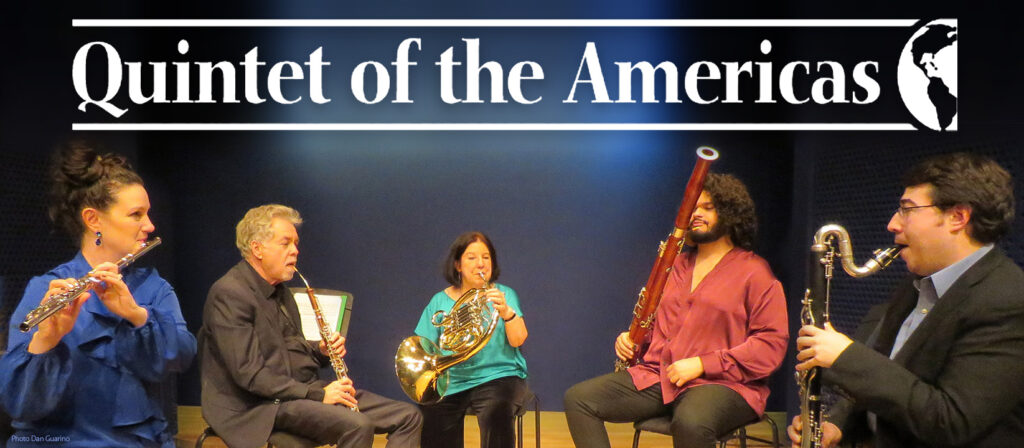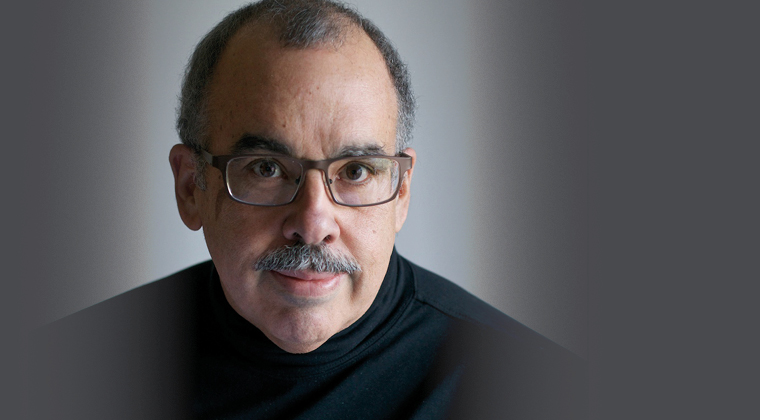Dona Rosita la soltera for Quintet and Soprano (1985)
Essays (1987)
Dos tonos de verde with orchestra (1991)
Estudios para quinteto de vientos (2011-2012)
Sexteto para piano y vientos (2014)
Quintet of the Americas was introduced to the music of Roberto Sierra in the mid-1980’s by the Puerto Rican mezzo Puli Toro when the Quintet premiered Doña Rosita on their series at the Americas Society. Soon after this the Quintet gave the NY premiere of Salsa para vientos.
In 1987 the Quintet commissioned Mr. Sierra for a new woodwind quintet. The resulting Essays was recorded by the Quintet in 1991 on the CD Never Sing Before Breakfast. In 1991 the Quintet commissioned Mr. Sierra for a new work for Quintet and chamber orchestra, Dos Tonos de verde which was premiered on the Quintet’s Carnegie Hall debut Jan. 9, 1992, and recorded on the Discovering the New World CD. Estudios para quinteto de vientos (2011-2012) and Sexteto para piano y vientos were premiered at the Americas Society in NYC on May 7, 2014.
The text for Doña Rosita is drawn from the Act I monologue of the homonymous play by Federico García Lorca, written in 1935, six years after the Andalusian poet’s sojourn in New York, and the year before his death. The delicate sense of distance in time and space, and the sense of loneliness in the poetry id tranformed into a delicate contrapuntal weaving of lines between the vocal part and the ensemble. The work ends in a metaphor of sound, one that points to the ephemeral and the unreal.
Of Essays, Mr. Sierra wrote “Movements 1, 3 and 5 deal with intervallic patterns that expand and contract between the minor second and the augmented fourth; movements 2 and 4 deal with polymetrics. The first movement starts with chromatic scales that gradually change to arpeggios…; the second movement superimposes melodic patterns in different tempi that are interrupted with an appoggiatura figure…; the third explores tremelos (the horn solo is structurally independent)…; the fourth is a canonic structure in which the imitations occur in different tempi…; the last starts with parallel pairs of instruments in parallel fourths contracting to minor seconds.”
for Estudios Sierra wrote, “Each piece is a study in texture, harmony and rhythms. A series of three notes chords forms the basis of the first piece and second etude. The virtuosic tutti character of the first etude and the solo lines that dominate in the second establish the contrast between these movements. These linear explorations also appear in the fourth and fifth movements, while the third and sixth movements take on a more rhythmic character. The distant rhythms of a habanera guide the seventh study, while the eight, ninth and eleventh studies return to a more declamatory and rhythmic style. The tenth study explores a linear blurred polyphonic texture, and the work closes with a perpetual motion line of expanding and contracting intervals that runs throughout the whole ensemble.”
Sierra’s notes for Sexteto para piano y vientos include “The juxtaposition of two whole-tone scales and the rotation of its pitches generate the sonorities of this sextet. The dual possibilities of these two scales opened up the exploration of new sonorities and even a new syntax for harmonic possibilities. Each movement deals with different melodic and harmonic possibilities offered by these rotations. The work starts with an energetic fast paced movement where Afro Caribbean clave derived rhythms provide continuity to a texture that is ever changing. The second movement combines the fast playful uneven rhythms of a Basque zortziko with slow and expressive music; in fact, there are two movements—strata—that happen simultaneously. The last movement recalls the first one, and exposes the final variants of the sonorities in full virtuosic display.”
See this for review: http://www.theaterscene.net/music/quintet-americas-wind-chamber-roberto-sierra/victor-gluck/
Roberto Sierra was born in 1953 in Vega Baja, Puerto Rico. He studied composition both in Puerto Rico and Europe, where one of his teachers was György Ligeti at the Hochschule für Musik in Hamburg, Germany.
For more than four decades, the works of Grammy-nominated and Latin Grammy winner Roberto Sierra have been part of the repertoire of many of the leading orchestras, ensembles and festivals in the USA and Europe. At the inaugural concert of the 2002 world renowned Proms in London, his Fandangos was performed by the BBC Symphony Orchestra in a concert that was broadcast by both the BBC Radio and Television throughout the UK and Europe. Many major American and European orchestras and international ensembles have commissioned and performed his works. Among those ensembles are the orchestras of Philadelphia, Pittsburgh, Atlanta, New Mexico, Houston, Minnesota, Dallas, Detroit, San Antonio and Phoenix, as well as the American Composers Orchestra, the New York Philharmonic, Los Angeles Philharmonic, National Symphony Orchestra, Royal Scottish National Orchestra, the Tonhalle Orchestra of Zurich, the Spanish orchestras of Madrid, Galicia, Castilla y León, Barcelona, Continuum, St. Lawrence String Quartet, Opus One, and others.
Commissioned works include: Concerto for Orchestra for the centennial celebrations of the Philadelphia Orchestra commissioned by the Koussevitzky Music Foundation and the Philadelphia Orchestra; Concerto for Saxophones and Orchestra commissioned by the Detroit Symphony Orchestra for James Carter; Fandangos and Missa Latina commissioned by the National Symphony Orchestra of Washington DC; Sinfonía No. 3 “La Salsa”, commissioned by the Milwaukee Symphony Orchestra; Danzas Concertantes for guitar and orchestra commissioned by the Orquesta de Castilla y León; Double Concerto for violin and viola co-commissioned by the Pittsburgh and Philadelphia Orchestras; Bongo+ commissioned by the Juilliard School in celebration of the 100th anniversary; Songs from the Diaspora commissioned by Music Accord for Heidi Grant Murphy, Kevin Murphy and the St. Lawrence String Quartet; and Concierto de Cámara co-commissioned by the the Santa Fe Chamber Music Festival, Chamber Music Northwest and Stanford Lively Arts.
In 2021 Roberto Sierra was elected to the American Academy of Arts and Letters and in 2017 he was awarded the Tomás Luis de Victoria Prize, the highest honor given in Spain to a composer of Spanish or Latin American origin. In 2010 he was elected to the prestigious American Academy of Arts and Sciences. In 2003 he was awarded the Academy Award in Music by the American Academy of Arts and Letters. The award states: “Roberto Sierra writes brilliant music, mixing fresh and personal melodic lines with sparkling harmonies and striking rhythms. . .” His Sinfonía No. 1, a work commissioned by the St. Paul Chamber Orchestra, won the 2004 Kenneth Davenport Competition for Orchestral Works. In 2007 the Serge and Olga Koussevitzky International Recording Award (KIRA) was awarded to Albany Records for the recording of his composition Sinfonía No. 3 “La Salsa”. Roberto Sierra has served as Composer-In-Residence with the Milwaukee Symphony Orchestra, The Philadelphia Orchestra, The Puerto Rico Symphony Orchestra and New Mexico Symphony.
Roberto Sierra’s Music may be heard on CD’s by Naxos, EMI, IBS Classics, UMG’s EMARCY, New World Records, Albany Records, Koch, New Albion, Koss Classics, BMG, Fleur de Son and other labels. In 2011 UMG’s EMARCY label released Caribbean Rhapsody featuring the Concierto for Saxophones and Orchestra, commissioned and premiered by the DSO with James Carter. In 2004 EMI Classics released his two guitar concertos, Folias and Concierto Barroco, with Manuel Barrueco as soloist (released on Koch in the USA in 2005). Sierra has been nominated twice for a Grammy under best contemporary composition category, first in 2009 for Missa Latina (Naxos) and in 2014 for his Sinfonia No. 4 (Naxos). In addition, his Variations on a Souvenir (ALbany) and Trio No. 4 (Centaur) were nominated for Latin Grammys in 2009 and 2015. In 2021 his Sonata para guitarra won the Latin Grammy for best classical contemporary composition.
The works of Roberto Sierra are published principally by Subito Music Publishing (ASCAP).
For more information visit https://www.robertosierra.com/

